
Sugar slips, ethanol tempts, but bulls fight
"The July sugar contract expired at 15.48 c/lb on June 30, pressured by weak receiver interest and poor-quality sugar, which led to a low delivery volume of 45kt. This bearish expiry overshadowed a potentially bullish UNICA report showing weather-related disruptions and low ATR, while TCH results also disappointed. Post-expiry, sugar prices struggled, raising concerns about diversion to ethanol, especially in Goiás and Mato Grosso, though logistical and contractual constraints limit flexibility. Ethanol’s recent premium stems more from sugar’s price drop than biofuel strength, with inventories stable and demand soft. Despite a bearish outlook, tight global stock-to-use ratios and recent bullish signals, like Pakistan’s 500kt import quota and lower EU crop expectations, helped prices rebound to 16.37 c/lb, easing parity concerns in key regions like São Paulo."
Sugar slips, ethanol tempts, but bulls fight
- The July sugar contract expired at 15.48 c/lb, weighed down by weak receiver interest and poor-quality sugar, leading to low delivery volume.
- Despite a bearish expiry, the UNICA report showed weather-related crushing disruptions and low ATR, though strong sugar mix.
- Ethanol premium over sugar improved in Goiás and Mato Grosso, but logistical constraints and existing contracts limit any major shift in Center-South’s aggregated sugar mix.
- Ethanol’s advantage came from falling sugar prices rather than fundamentals from its own market, with inventories stable and hydrous sales trailing last year.
- Late-week buying interest, Pakistan’s 500kt import quota, and lower EU crop expectations helped sugar rebound to 16.37 c/lb.
The July sugar contract expired at a settlement price of 15.48 c/lb on Monday, June 30, with long positions ultimately losing ground as receiver interest faded. According to traders, one of the main drivers behind this behavior was the poor quality of sugar available for delivery, which contributed to the exceptionally low volume, just 888k lots, or 45kt.
Image 1: July Historical Deliveries (‘000t)
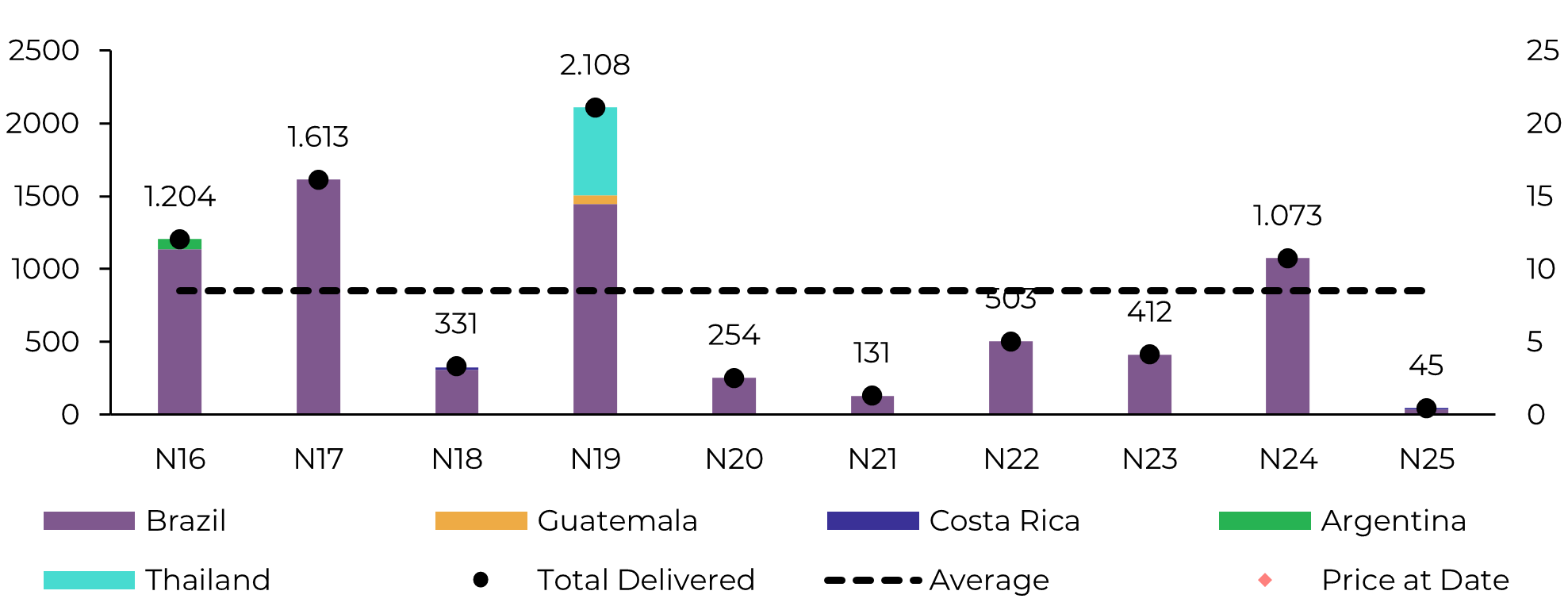
Source: ICE, Hedgepoint
Image 2: Sugar and Hydrous Parity (São Paulo State | c/lb)
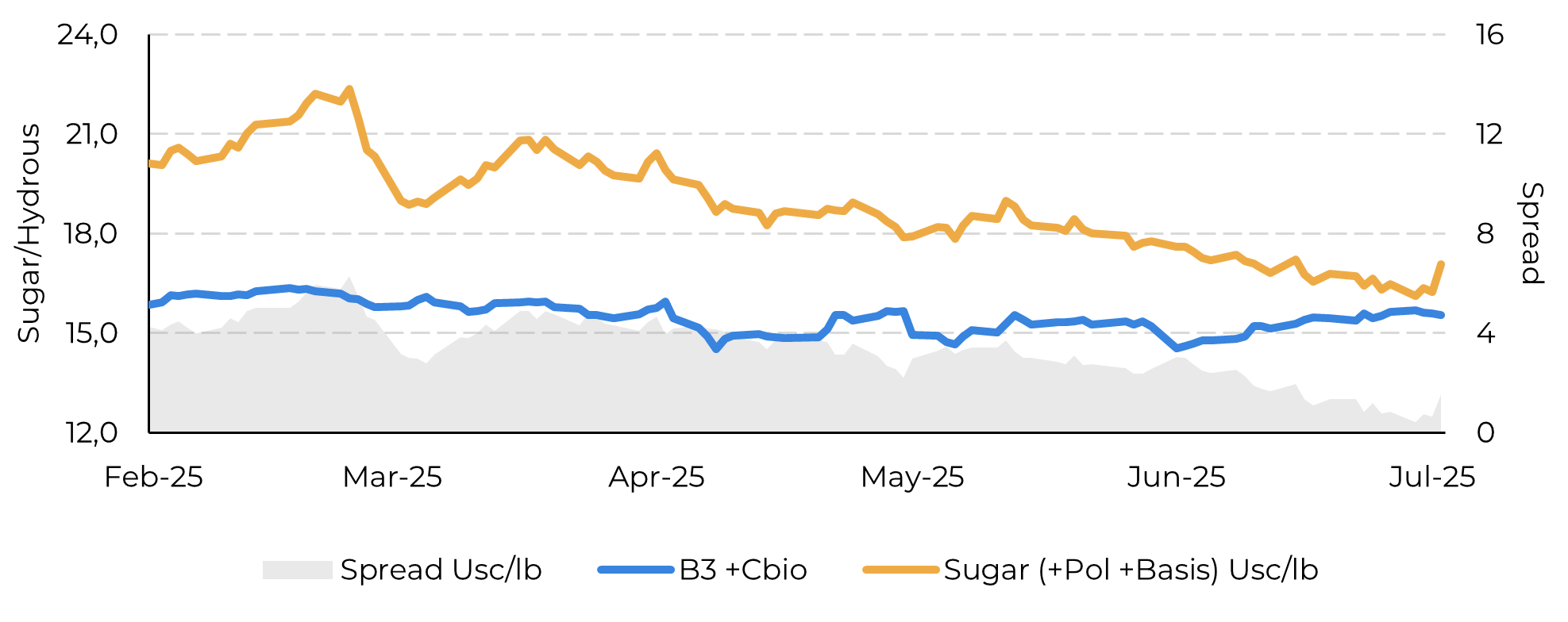
Source: Source: Bloomberg, Hedgepoint
Image 3: Hydrous Share in Fuel Demand (Hydrous/(Hydrous + Gasoline))
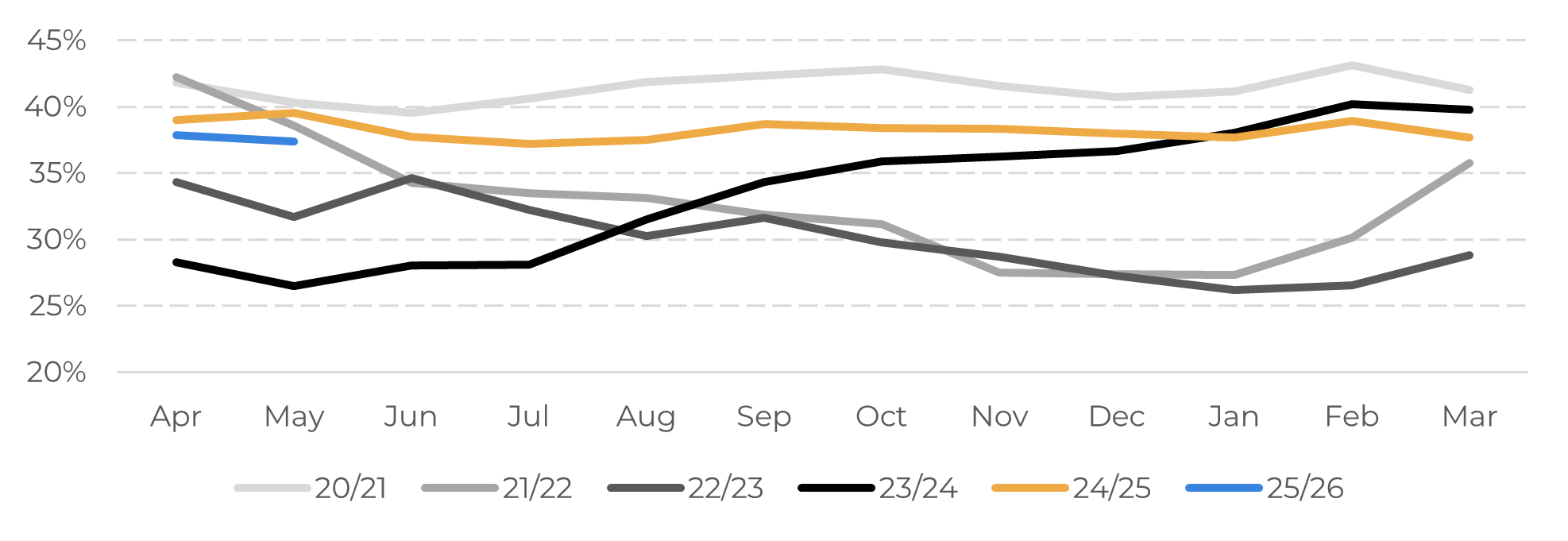
Source: Source: ANP, Hedgepoint
Image 4: Stock in Key Producers (Crop Year)
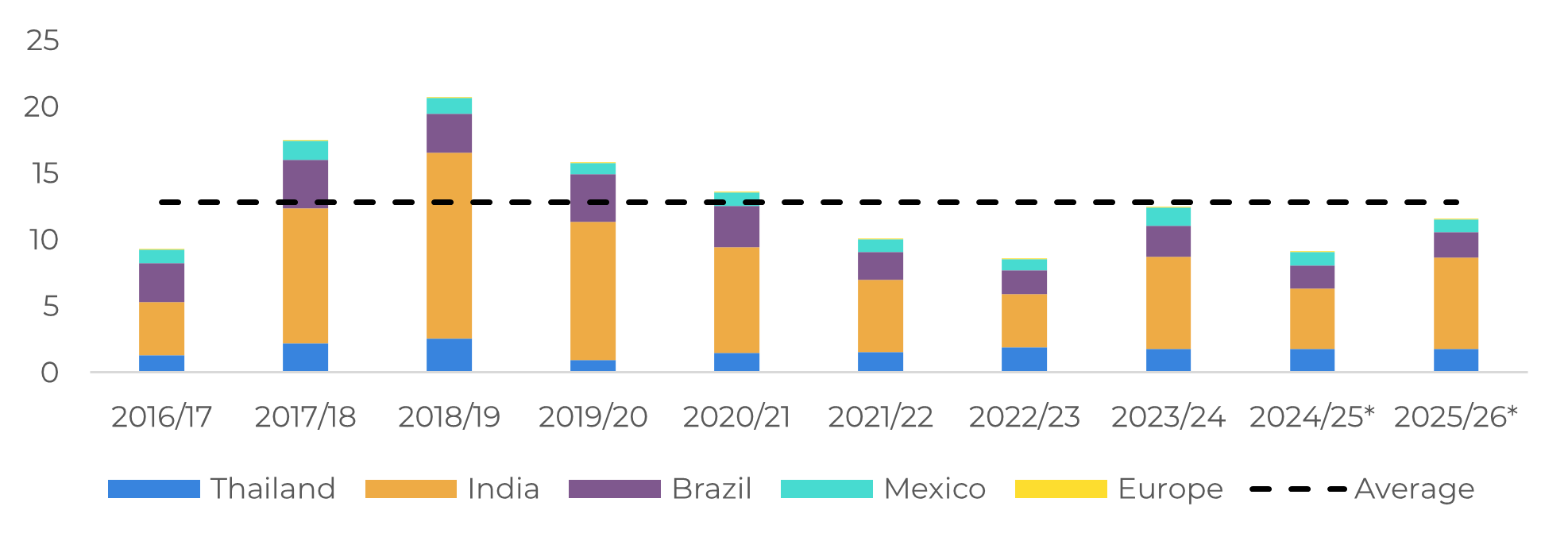
Source: ANP, Hedgepoint
Image 5: Global Stock to Use vs Average Prices (Oct-Sep)
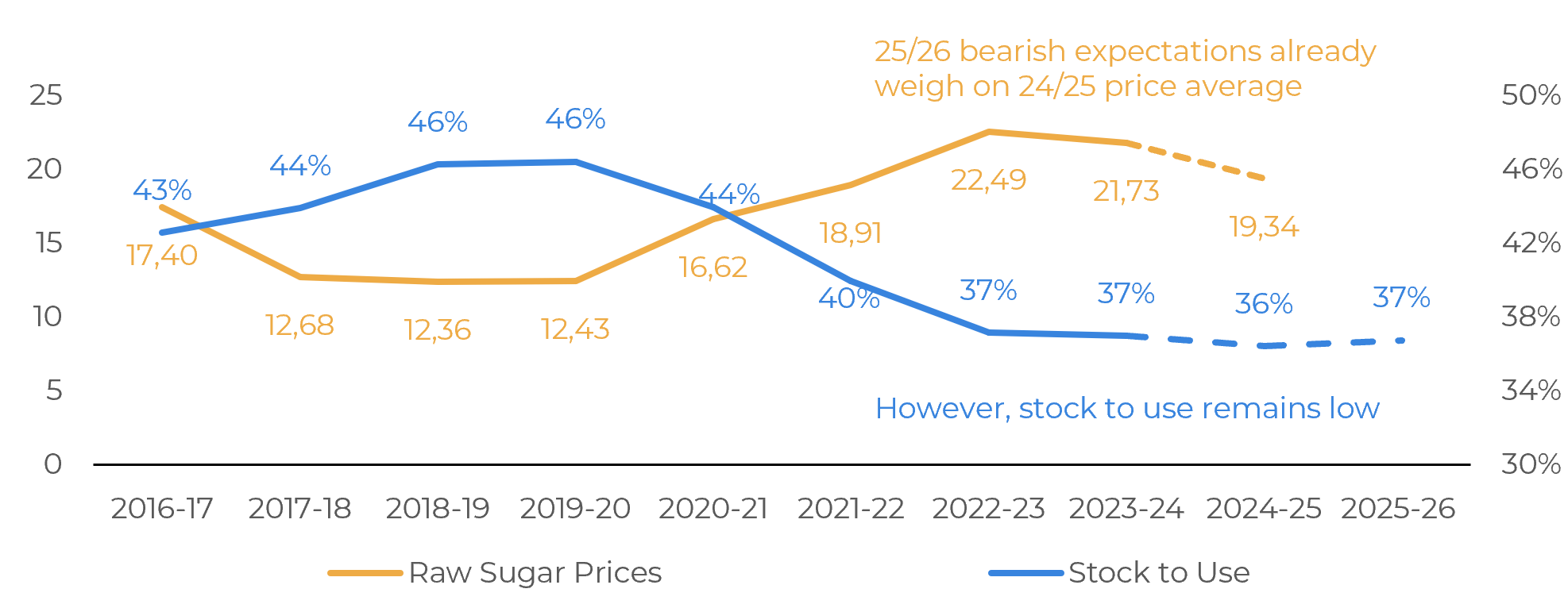
Source: Hedgepoint
In Summary
Weekly Report — Sugar
livea.coda@hedgepointglobal.com
thais.italiani@hedgepointglobal.com
Disclaimer
This document has been prepared by Hedgepoint Schweiz AG and its affiliates (“Hedgepoint”) solely for informational and instructional purposes, without intending to create obligations or commitments to third parties. It is not intended to promote or solicit an offer for the sale or purchase of any securities, commodities interests, or investment products. Hedgepoint and its associates expressly disclaim any liability for the use of the information contained herein that directly or indirectly results in any kind of damages. Information is obtained from sources which we believe to be reliable, but we do not warrant or guarantee the timeliness or accuracy of this information. The trading of commodities interests, such as futures, options, and swaps, involves substantial risk of loss and may not be suitable for all investors. You should carefully consider wither such trading is suitable for you in light of your financial condition. Past performance is not necessarily indicative of future results. Customers should rely on their own independent judgment and/or consult advisors before entering into any transactions. Hedgepoint does not provide legal, tax or accounting advice and you are responsible for seeking any such advice separately. Hedgepoint Schweiz AG is organized, incorporated, and existing under the laws of Switzerland, is filiated to ARIF, the Association Romande des Intermédiaires Financiers, which is a FINMA-authorized Self-Regulatory Organization. Hedgepoint Commodities LLC is organized, incorporated, and existing under the laws of the USA, and is authorized and regulated by the Commodity Futures Trading Commission (CFTC) and a member of the National Futures Association (NFA) to act as an Introducing Broker and Commodity Trading Advisor. HedgePoint Global Markets Limited is Regulated by the Dubai Financial Services Authority. The content is directed at Professional Clients and not Retail Clients. Hedgepoint Global Markets PTE. Ltd is organized, incorporated, and existing under the laws of Singapore, exempted from obtaining a financial services license as per the Second Schedule of the Securities and Futures (Licensing and Conduct of Business) Act, by the Monetary Authority of Singapore (MAS). Hedgepoint Global Markets DTVM Ltda. is authorized and regulated in Brazil by the Central Bank of Brazil (BCB) and the Brazilian Securities Commission (CVM). Hedgepoint Serviços Ltda. is organized, incorporated, and existing under the laws of Brazil. Hedgepoint Global Markets S.A. is organized, incorporated, and existing under the laws of Uruguay. In case of questions not resolved by the first instance of customer contact (client.services@Hedgepointglobal.com), please contact internal ombudsman channel (ombudsman@hedgepointglobal.com – global or ouvidoria@hedgepointglobal.com – Brazil only) or call 0800-8788408 (Brazil only). Integrity, ethics, and transparency are values that guide our culture. To further strengthen our practices, Hedgepoint has a whistleblower channel for employees and third-parties by e-mail ethicline@hedgepointglobal.com or forms Ethic Line – Hedgepoint Global Markets. “HedgePoint” and the “HedgePoint” logo are marks for the exclusive use of HedgePoint and/or its affiliates. Use or reproduction is prohibited, unless expressly authorized by HedgePoint. Furthermore, the use of any other marks in this document has been authorized for identification purposes only. It does not, therefore, imply any rights of HedgePoint in these marks or imply endorsement, association or seal by the owners of these marks with HedgePoint or its affiliates.
To access this report, you need to be a subscriber.
Contact us
Check our general terms and important notices.
We have updated our Terms & Conditions to reflect improvements to our platform, data handling practices, and the overall experience we provide to our clients.

